This story is part four of Boardroom’s Women’s History Month series highlighting bold figures forging distinctive paths in the worlds of sports, business, culture, and entertainment.
Part I: Morgan DeBaun | Part II: Valentina Shevchenko | Part III: Dany Garcia
From writing for A Different World to directing blockbuster hits Love & Basketball and Beyond The Lights, Prince-Bythewood has proven herself as an enduring power player in the film industry.
Do you remember the moment in which you realized that you found your calling? For some athletes, it’s the feeling of watching their first big-league championship game in-person. As a singer, perhaps it’s finally nailing a high C in their church choir solo. In Gina Prince-Bythewood’s case, it was watching classic films Benji and E.T. the Extra-Terrestrial in theaters for the first time.
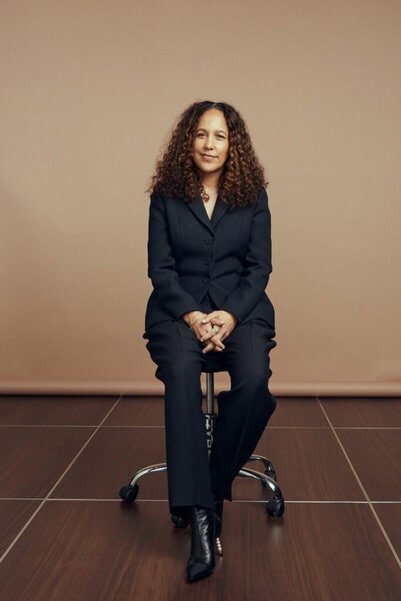
“Those are two films I can still feel the way I felt sitting in the theater watching those two things,” Prince-Bythewood told Boardroom as a wave of nostalgia overcame her. “I was young, so to feel that deeply in watching this story up on-screen that’s all made up, I was always blown away by that when I was a kid and going to the Saturday matinees that they had every week at our local theaters that our parents used to drop us off at every weekend probably to get a break.”
Who would have guessed that the energy of a handful of Saturday trips to the cinema would eventually snowball into the creation of the woman we know today as the inconquerable Gina Prince-Bythewood, who has been responsible for some of the top-grossing films within Black culture including Beyond the Lights, Love & Basketball, and The Secret Life of Bees?
During our 28-minute phone conversation, Prince-Bythewood revealed to me the ways in which she was proud of her growth as a filmmaker, and that her filmography is a direct reflection of her elevation in the industry — and it’s difficult not to agree.
“You have to have swagger within this industry, and certainly as a Black woman now navigating the big sandbox I’m happy to be in at this point and trust it was hard-fought to get here,” she said, “but there’s a supreme belief that in my abilities. I know I belong here. I know I deserve to be in this space, and I know I’m gonna knock it out.”
Now, ahead of the 2023 Academy Awards on March 12, Boardroom had the opportunity to exclusively catch up with Prince-Bythewood about her career trajectory within the entertainment industry, thoughts on her acclaimed film The Woman King getting snubbed for certain top awards, and why it’s important to highlight women consistently in film and television boardrooms near and far.
Love & Film
When asked about some of her biggest mental and emotional challenges she faced upon embarking on her journey to success, Prince-Bythewood did not hesitate to share a quote from The Woman King star Viola Davis about “hustling for your worth.” As the EGOT-decorated actress shared her feelings in an interview alongside the director, it clicked for Prince-Bythewood that she had perfectly described what she would experience internally when pitching her scripts.
“My work always centering us and certainly centering Black women and getting blank stares back? You just feel like you’re going in there trying to convince people that your stories matter and year after year after year with the same arguments and just waiting to get that one,” she noted to Boardroom about her constant advocacy for Black folks, and especially Black women and femme-identifying persons, in her work. “That’s the hardest thing; that toll because it’s not just, ‘Oh, I’m not feeling the story that I think most others may deal with.’ It goes so much deeper than that in people not seeing the value in your stories or your characters. That’s the toughest thing.”
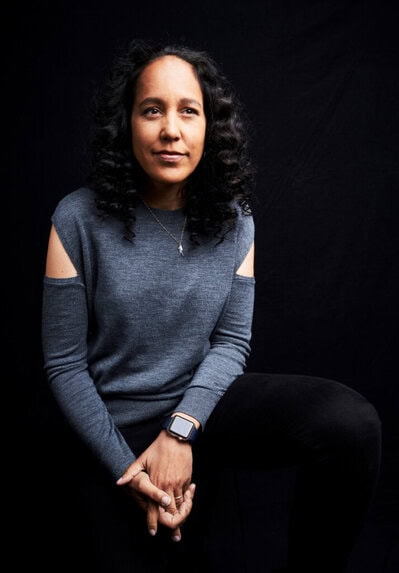
Despite the hardships, rejections, and myriad twists and turns that she’s experienced throughout the course of her career, Prince-Bythewood stayed the course and fought for the voices of women, Black women, and the Black community in its entirety to be represented in every piece of art that she presents to the world. The Los Angeles native proudly uses her platform to tell unapologetic stories that others may have been downright scared to write, produce, and direct because of society’s fears regarding giving women, femme-identifying persons, and queer folks the shine they deserve and the voice that’s been so consistently smothered under the heteronormative pillow of the entertainment business.
“It’s [about] not being afraid to speak out, and it’s a sad thing that some are afraid to speak out for fear of what that can do to their career. We can’t function that way because that’s why it continues the way it does,” Prince-Bythewood said with passion. This invoked more thoughts about the trajectory of her own career and how she moves, as well as how she can leverage the power she has behind the camera — from fighting for The Woman King production designer Akin McKenzie to championing costume designer Gersha Phillips, Prince-Bythewood made it a priority to give her crew and department heads an opportunity of a lifetime for what became a decorated box office hit.
“It’s just Black folks who were really good who didn’t have a big movie like this on the resume, but I saw the talent and I had to fight to get them on my film because a studio looked at their credits and says, ‘Well, we can’t trust them,'” she said.
It’s a hallmark of her career — as the woman in the director’s chair, Prince-Bythewood has used her voice to advocate tirelessly for first-timers and ostensible novices in the industry to give them the chance that she believed they needed to take their careers to new heights.
“It has to do with me sitting in the director’s chair in working on a really big film where the Black female hero, her story was being taken away and diminished. If I was not in the director’s chair to say, ‘Fuck no, that’s not happening,’ it would’ve happened. You have a front-row seat to see how that happens in so many films. It’s because we’re not in the director’s chair, so I fight for what I believe in. I fight for us,” she said.
Prince-Bythewood additionally noted how her husband, Reggie Rock Bythewood — creator of the Apple TV+ series Swagger — similarly insists on hiring crews that look like accurate depictions and faithful reflections of the real diverse world that we live in. “He fought to make sure it looks like that,” she said. “We have to fight inside and we have to fight outside.”
The New Guard of Accountability
The great human rights activist and prime mover of the civil rights movement Malcolm X once stated that the most disrespected, unprotected, and neglected person in America is the Black woman — and Gina Prince-Bythewood is no stranger to this sad, yet still-painfully-relevant idea in today’s society. Within the entertainment and film industry, she believes that this is demonstrated not only through a lack of diverse portrayals on our various screens, but also in the way power is distributed but rarely shared equitably in the boardrooms when it comes to big decisions on production, direction, and screenwriting.
“It is demonstrated in the few number of [diverse] films that are made, the smaller budgets, the lack of story or depth in our characters, and certainly on sets,” she said powerfully when listing the examples of women, specifically Black women, who are belittled and counted out in the television and film industries. “If you talk to Black actresses, the micro and macroaggressions that they deal with from how they’re treated by ad staff to hair departments, to wardrobe, by directors, it’s heartbreaking. That’s why it’s so important for more of us to get to the director’s chair because we value each other and we see the value in each other, and we fight for each other. I’ve had to do it myself, and I’m proud to do that but it breaks my heart to hear what goes on.”
Now, the question stands: How can we, as a community, hold the entertainment, film, and television businesses accountable when it comes to advocating and championing for and amplifying female and Black women-centric stories? Prince-Bythewood shared her thoughts on how to make a small step forward in the entertainment industry that could ultimately enable a leap forward for female and femme-identifying stories and leads.
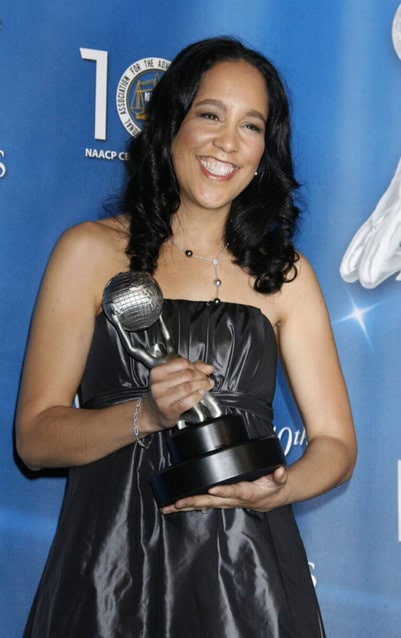
“It has to start with an acknowledgment of the systemic issues of our industry. At that point, once you can acknowledge and not be defensive about it and really understand what’s going on, then it’s about people making concrete changes in how they behave,” she said.
From how they move in the industry to where they’re deciding to leverage their social capital, Prince-Bythewood notes that there are ways to be a proper accomplice in the uplifting of women beyond one month on the calendar or one project that you’re on the call sheet for.
“We need true allies in this industry until we share enough power to not need that. We’re not at that place yet, but it’s certainly amongst my fellow filmmakers and actors. We are starting to really talk about the necessity for a collective that truly amplifies each other, supports each other, and finding ways to work with each other,” she continued.
“That’s what we need — not only for sustainability, but for our mental health as well, and also for creativity to be able to tell our stories in our own spaces the way we wanna tell ’em with each other. That’s where you’re gonna get the most truth and authenticity – in the hopes that then you put these beautiful films in the world and they find a large audience.”
Gina Prince-Bythewood, Our Woman King
With representation of the African diaspora, a cast full of fierce Black women, and top-notch direction from Prince-Bythewood herself, it’s no wonder why The Woman King was a box office hit that scored a $19 million debut during its opening weekend. Elements of romance, action, drama, and fearless integration of feminism and racial justice themes were a few of the key ingredients that made this film such a success, but there was one particular theme that Prince-Bythewood was most proud of.
“[When] I went into it, the thing that excited me was that The Woman King had so many beautiful things that make us love movies. Part of that was the different love stories within it,” Prince-Bythewood said, noting the “beautiful love story of a mother and daughter” between Thuso Mbedu’s Nawi and Viola Davis’ Nanisca. In contrast to the love stories of Quincy and Monica in Love & Basketball and Noni and Kaz from Beyond The Lights, this film’s aura of love radiates through elements of sisterhood and strength in leaning on the women in your corner.
“You get historical and you also get great drama, and you also get great action. That’s a beautiful thing to be able to put all of that within the film and give us not only the excitement and the joy and the pain, but also the vulnerability and the complexity that you want,” she said. “I think every filmmaker wants the opportunity to do that with their characters, their stories, and audiences. We found certainly that the success, that audiences are craving that as well.”
Typically, action-categorized films cast heteronormative, cisgendered males as the leads, but Prince-Bythewood had a different idea for The Woman King, as well as for The Old Guard starring Kiki Layne. As someone who has herself experienced the feeling of being the femme minority as a child athlete in soccer, basketball, track, and football, Prince-Bythewood considers it a personal imperative to let women know that it’s okay to strive to be the best, want to win, and have the mentality of an athlete to succeed in whatever industry you’re in.
“As I got older, I was shocked to find out how few women had that mentality of an athlete, of knowing that it’s okay to outwork everybody. It’s right to have stamina; to leave everything out on the floor; those incredible lessons that you learned as an athlete,” she said of her own background in sports.
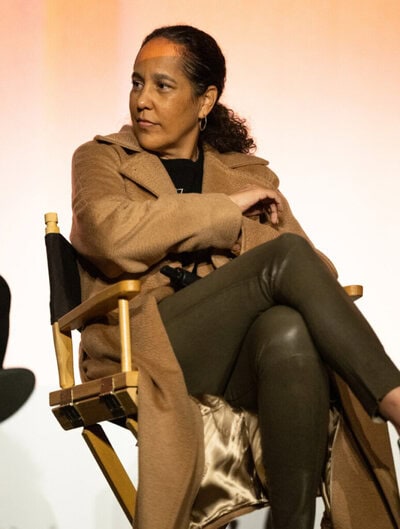
Prince-Bythewood noted that unlike the Black community, young white counterparts are continuously offered superhero roles that have historically looked just like them across television and film. She noticed that it wasn’t until Ryan Coogler’s Black Panther that our young Black kings were able to see themselves on-screen. She reminisced on the initial reactions from her two sons coming out of the theatre after seeing Chadwick Boseman in the leading role, and as incredible as that was, she knew there was more work to do for women.
Even when tapped to direct Silver & Black, an ultimately unproduced 2017 Spider-Man spinoff she co-wrote that would have crowned her as the first Black woman to helm a studio-produced superhero film, Prince-Bythewood did not feel a sense of victory. “It didn’t feel like an honor because we’re still having firsts. It was more of, ‘Okay, I got this gig and I need to come through, I need to do it the right way and make a really good film so that there’s no more question about whether we can do it or not,’ because that was the issue,” she sai
Despite having to walk away from the opportunity due to feeling the wrong type of pressure, she ultimately walked into a new open door known as The Old Guard.
“To take on The Old Guard, there were many reasons that I took it on, but at the top of that list was [that] I get to put a young Black female hero into the world. The Woman King was that on steroids, where I get to put these incredibly heroic, badass, strong women who are also vulnerable, complex, loving, fought for each other, and showed the power of sisterhood,” Prince-Bythewood raved about the dichotomy of her work in achieving balance and representation for women. “Now, little girls get to grow up, have this in the world, and know that they can be warriors and heroes. That can absolutely change mentality. It can change culture. It’s gonna take years and years to undo the damage that our industry has done to our community through the lack of images, but the more we can see ourselves as heroes, the more that sinks in as we’re growing up, knowing that that is possible for us.”
The Not-so-secretive Support of The Woman King
Let’s state it clearly: The Woman King absolutely deserved to be nominated for an Oscar, whether for Viola Davis’ outstanding leading performance or Prince-Bythewood’s direction. To say that the Academy failed not only women, but Black women specifically, is an understatement — and the director agreed during our conversation. For the snub seen ’round the world, culture critics, entertainment experts, and film fans alike ran to social media to show the profoundest support for the film, Prince-Bythewood, and the Black women who felt shut out as a result of the lack of a nomination.
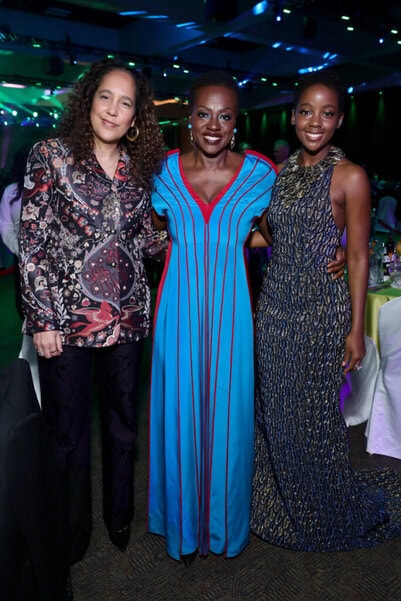
For the director in particular, this was bigger than a movie, a nod, or an award. This, as a Black woman, was personal.
“The Woman King feels like it’s on steroids right now. It’s incredibly meaningful how people come up every single day to say something and there’s just something extra special about this film that people are responding to and being able to see themselves reflected this way,” she said.
“The reaction was stunning because it was so personal. It felt like the audience took it personal — and honestly, we should, because it was an attack on all of us, an attack on all of our excellence, an attack on every person in any industry, in any instance, whose excellence has not been acknowledged, who has to fight to be heard, who has to fight to be seen,” Prince-Bythewood said about her initial reaction to this year’s Oscar nominations announcement on Jan. 24.
“That’s what it felt like: just a collective middle finger. It means a lot because when I spoke out, The Woman King is reflective of the systemic issues, but I was speaking for all of us,” she said, “and it meant a lot that people were listening and that they chose to join me and be loud, because that’s what it’s gonna take. We can’t stay quiet. We have to be loud about this.”
In The Woman King, Prince-Bythewood used her directorial lens and non-monolithic experience as a Black woman to demonstrate the beauty of Blackness across the African diaspora and intentionally uplift the story of our ancestors. From South and West Africans to Jamaicans and African-Americans, Prince-Bythewood found it to be absolutely “imperative” to tell the stories that stem from our ascension from the motherland.
“We all started in Africa. These are our ancestors. So to be able to come together as a collective and tell the story in the motherland, I wanted us to feel connected in a way that we are not as often as we should; we should feel a connection to Africa,” she said.
“Every African American should make the travel to the continent. It changes you and vice versa. There should absolutely be more connection between us because we are connected and anybody trying to separate us is doing it intentionally to cut us off from our beautiful history,” Prince-Bythewood concluded. “Like every culture, there are great highs and there’s great lows, but we are never taught the great highs. It affects us here. What we’re all taught is that our history begins with enslavement and there’s so much more to us that’s been erased or been debased and changed — and films like The Woman King can absolutely start to bridge that gap.”